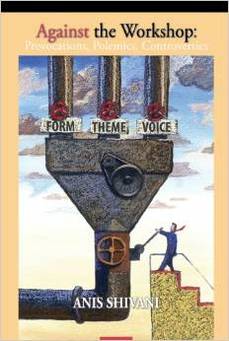
It was heartening to read, from the introduction: “At least the [literary] gatekeepers everywhere are visibly biting the dust”. He has studied the scene, and in his essay on fiction discusses the mechanics of it, with many of his tropes applicable equally well to poetry. Still, the limits of this kind of inspection are evident. The writer today has issues to worry about beyond who gets published and why.
He writes:
Contemporary literary fiction has chosen to marginalize itself from mainstream culture. It has its own niche, like specialized Foucauldian sociology or Derridean philosophy, catering to the sensibilities of other experts in the field.
The essay “Writers in Universities” addresses more directly the issue:
University teaching has the following overlapping deleterious effects on writing: a) shrinkage of the writer’s audience to likeminded academics; b) disinterest in the fiction and poetry of public import; c) inability to redraw the given boundaries of the chosen genre; d) lack of risk-taking and subversion, because of the shrunken reconceptualization of the writer’s status; e) infinitesimal subdivisioning of the writing, rather than branching out to encompass competing genres—a typical academic malady; f) focus on immediate reward rather than continuance of the literary tradition; g) withdrawal from public engagement, to the fatal detriment of literature’s timeless values; and h) reorientation toward the lowest common denominator, dumbing down writing.
Really less substantial than I would have wished, but he [gives] a good description of all the poetry being written in today's MLA culture as being career-driven, in which case, oh this is off the cuff here, it's a three step process. 1) teachers have to teach absurd ideas like "voice" (he rants on about this) and then can't help but have their writing begin to resemble the rules they preach. 2) to make headway in your career you have to write kinda in imitation of your teachers and 3) for gods sake don't say anything substantive or wave-making as that might derail your career...
In relation to the “conceptualism” post of a few days ago, David Need made an apropos comment at the Montevidayo site:
I guess I can’t see the point of preserving anything called “conceptualism” so I don’t see why any effort should be spent assuming “an articulation of conceptualism’s globality,” nor any point to using its “trans-national significance as a way to catalogue and historicize contemporary literary production.” It’s like wanting in on the aristocracy, isn’t it?

 RSS Feed
RSS Feed